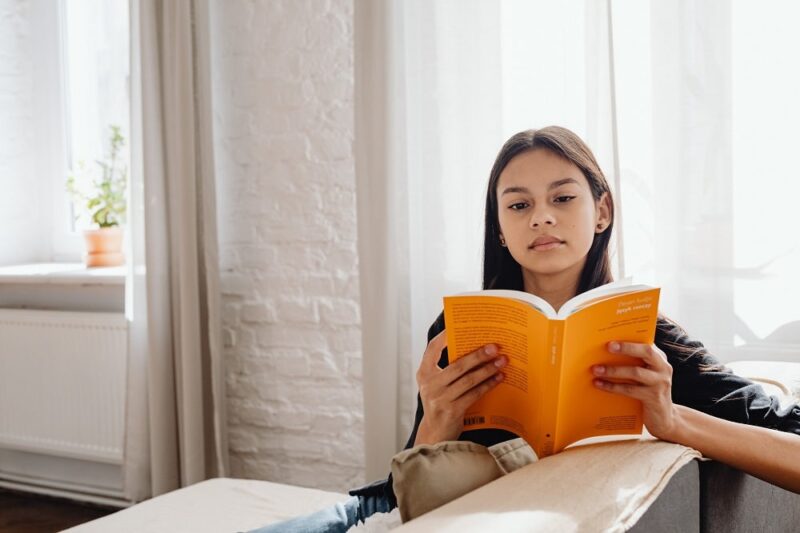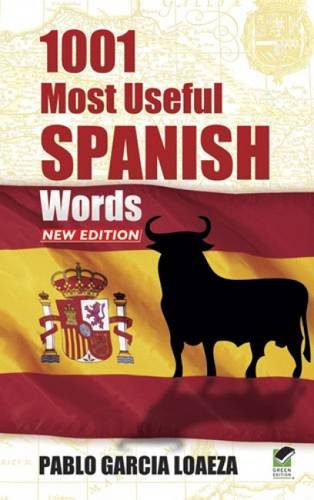
32 Advanced Spanish Adjectives for Better Self-expression
There comes a point in your Spanish studies where you have to get proactive about enriching your adjective vocabulary list as much as you can.
We’ve compiled a list of 32 advanced Spanish adjectives for you to use and spice up your conversations, as well as seven excellent additional resources so you can keep learning more and more Spanish adjectives.
Contents
- Advanced Spanish Adjectives
-
- 1. Desagradecido — Ungrateful
- 2. Inesperado — Unexpected
- 3. Incipiente — Emerging
- 4. Inexacto — Inaccurate
- 5. Inadmisible — Unacceptable
- 6. Ridículo — Ridiculous
- 7. Inadecuado — Unsuitable
- 8. Sabio — Wise
- 9. Asustado — Frightened
- 10. Asqueroso — Disgusting
- 11. Conocido — Well-known
- 12. Presuntuoso — Conceited
- 13. Trivial — Trivial
- 14. Abundante — Abundant
- 15. Carismático — Charismatic
- 16. De poca confianza — Untrustworthy
- 17. Travieso — Mischievous
- 18. Duradero — Durable
- 19. Reluctante — Reluctant
- 20. Reconfortante — Comforting
- 21. Genuino — Genuine
- 22. Resistente — Resistant, resilient
- 23. Emocionante — Exciting
- 24. Solemne — Solemn
- 25. Incómodo — Uncomfortable, awkward
- 26. Asombrado — Amazed
- 27. Meticuloso — Meticulous, careful
- 28. Eficiente — Efficient
- 29. Hecho a mano — Handmade
- 30. Fascinante — Fascinating
- 31. Preocupado — Worried
- 32. Increíble — Incredible
- How to Use Spanish Adjectives
- Resources for Learning More Advanced Spanish Adjectives
- And One More Thing…
Download: This blog post is available as a convenient and portable PDF that you can take anywhere. Click here to get a copy. (Download)
Advanced Spanish Adjectives
1. Desagradecido — Ungrateful
Example: No seas desagradecido con tus padres. (Don’t be ungrateful to your parents.)
Synonyms: Ingrato, desnaturalizado
2. Inesperado — Unexpected
Example: El divorcio de Fernanda fue inesperado. (Fernanda’s divorce was unexpected.)
Synonyms: Casual, brusco, insospechado
3. Incipiente — Emerging
Example: Su barba incipiente lo hacía lucir desaliñado. (His emerging (growing) beard made him appear untidy.)
Synonyms: Rudimentario, embrionario, primitivo, naciente
4. Inexacto — Inaccurate
Example: Lo que estás diciendo no es completamente incorrecto, pero es inexacto. (What you are saying is not completely incorrect, but it is inaccurate.)
Synonyms: Incorrecto, errado, falso, equivocado
5. Inadmisible — Unacceptable
Example: El plagio es una conducta inadmisible en la universidad. (Plagiarism is unacceptable in university.)
Synonyms: Inacceptable
6. Ridículo — Ridiculous
Example: Lo que dijo sobre la pintura moderna fue ridículo. (What he said about the modern painting was ridiculous.)
Synonyms: Grotesco, absurdo, necio, cómico
7. Inadecuado — Unsuitable
Example: Este programa es inadecuado para el horario infantil. (This program is unsuitable for a children’s time period.)
Synonyms: Inconveniente, incongruente, impropio, opuesto
8. Sabio — Wise
Example: Sus sabios consejos le ayudaron a enderezar su vida. (His wise advice helped him to rectify his life.)
Synonyms: Erudito, ilustrado, científico
9. Asustado — Frightened
Example: No había nadie en casa, sólo el perro asustado por la tormenta. (There was no one at home except the dog, who was frightened by the storm.)
Synonyms: Acobardado, atemorizado
10. Asqueroso — Disgusting
Example: De allí salía un olor asqueroso a pescado podrido. (The smell of a disgusting, decomposed fish came from down there.)
Synonyms: Inmundo, repugnante, sucio, repulsivo, nauseabundo
11. Conocido — Well-known
Example: Esta vez probamos suerte y no fuimos a cenar a un restaurante conocido. (We tried our luck this time and didn’t have dinner at a well-known restaurant.)
Synonyms: Célebre, afamado, famoso, popular
12. Presuntuoso — Conceited
Example: Juan es un presuntuoso. Cree que hace todo mejor que nadie. (Juan is conceited. He thinks he does everything better than anyone else.)
Synonyms: Presumido, altanero, pretencioso
13. Trivial — Trivial
Example: Es un hombre muy superficial, su plática trivial me aburre. (He’s a superficial man, his trivial conversation bores me.)
Synonyms: Banal, insignificante
14. Abundante — Abundant
Example: Este río es abundante en truchas. (Trout are abundant (or plentiful) in this river.)
Synonyms: Cuantioso, copioso, desbordante
15. Carismático — Charismatic
Example: El carismático político ha sido reelegido. (The charismatic politician has been reelected.)
Synonyms: Agradable
16. De poca confianza — Untrustworthy
Example: Él me dijo que su hermana es de poca confianza. (He told me that his sister is untrustworthy.)
Synonyms: No fidedigno, rajón, fajón
17. Travieso — Mischievous
Example: El niño no es malo, solo es muy travieso. (The child is not a bad kid, he is just very mischievous.)
Synonyms: Revoltoso, enredador, diablillo
18. Duradero — Durable
Example: El objetivo es conseguir un motor duradero y confiable. (The goal is to get a durable and trustworthy motor.)
Synonyms: Resistente, durable, estable, firme, permanente
19. Reluctante — Reluctant
Example: Juan estaba reluctante a decir la verdad a los policías. (Juan was reluctant to tell the truth to the policemen.)
Synonyms: Reacio, reticente, opuesto
20. Reconfortante — Comforting
Example: La reunión con su familia fue reconfortante para él después de la tragedia. (It was comforting to him to be with his family after the tragedy.)
Synonyms: Reconstituyente, vigorizador
21. Genuino — Genuine
Example: Este vino es genuino, su gusto no deja lugar a dudas. (This wine is real, its taste doesn’t leave any doubt.)
Synonyms: Auténtico, real, original, verdadero
22. Resistente — Resistant, resilient
Example: Ha surgido una cepa resistente a los antibióticos. (An antibiotics-resistant strain appeared.)
Synonyms: Tenaz, duro, robusto, poderoso, vigoroso, fuerte, eficaz
23. Emocionante — Exciting
Example: La final del Mundial de Sudáfrica 2010 fue muy emocionante. (The world cup final game in South Africa was exciting.)
Synonyms: Interesante, excitante
24. Solemne — Solemn
Example: No te puedes estar riendo en un acto tan solemne como este. (You can’t be laughing during an event as solemn as this one.)
Synonyms: Formal, serio, enfático, ceremonioso, grave, digno, severo
25. Incómodo — Uncomfortable, awkward
Example: Se hizo un incómodo silencio al entrar su hermano. (An awkward silence happened when his brother came into the room.)
Synonyms: Irritante, molesto, perturbador
26. Asombrado — Amazed
Example: Se quedaron asombrados de lo fácil que era. (They were amazed at how easy this was.)
Synonyms: Confuso, atónito, estupefacto
27. Meticuloso — Meticulous, careful
Example: Juan es muy meticuloso en su trabajo y siempre quiere que quede perfecto. (Juan is very careful during his work and always wants things to be perfect.)
Synonyms: Minucioso, detallista, escrupuloso
28. Eficiente — Efficient
Example: Los trabajadores de su empresa son muy eficientes y han convertido la empresa en líder del mercado. (The workers in his company are very efficient and have made the company a leader in its field.)
Synonyms: Eficaz
29. Hecho a mano — Handmade
Example: Esta cartera está totalmente hecha a mano. (This wallet is completely handmade.)
30. Fascinante — Fascinating
Example: Me parece fascinante la personalidad de mi jefe. (I find my boss’s personality fascinating.)
Synonyms: Alucinante, atrayente, deslumbrante, encantador
31. Preocupado — Worried
Example: Un padre siempre es un hombre preocupado. (A dad is always a worried man.)
Synonyms: Intranquilo, inquieto, alarmado
32. Increíble — Incredible
Example: Por increíble que parezca, una cucaracha puede sobrevivir sin cabeza varias semanas. (Although it may seem incredible, a cockroach can survive for several weeks without a head.)
Synonyms: Inverosímil, inconcebible
How to Use Spanish Adjectives
Let’s give you a quick refresher on how to use these adjectives properly in Spanish.
Changing an Adjective’s Gender
Unlike in English, where adjectives have only one form, Spanish adjectives change form to agree with the gender of the noun they modify (masculine or feminine) and the number indicated by the noun (plural or singular).
Most Spanish adjectives end in –o in their masculine form and –a in their feminine form.
Masculine Form Feminine Form Meaning
aburrido aburrida boring
afortunado afortunada fortunate
enfermo enferma sick
enojado enojada angry
Nevertheless, there are some exceptions to this rule. Sometimes, a masculine singular Spanish adjective may end in –a or –e, or even a consonant.
Masculine Form Feminine Form Meaning
egoísta egoísta selfish
materialista materialista materialistic
eficiente eficiente efficient
responsable responsable responsible
azul azul blue
débil débil weak
Making Adjectives Plural
There are three basic rules to making adjectives plural in Spanish.
First, you just add a –s to singular adjectives ending in a vowel.
Singular Form Plural Form Meaning
alto altos tall
rubia rubias blonde
interesante interesantes interesting
Second, you add –es to adjectives ending in a consonant.
Singular Form Plural Form Meaning
fácil fáciles easy
trabajador trabajadores hardworking
Third, if a singular adjective ends in –z, change –z to –c and add –es.
Singular Form Plural Form Meaning
feliz felices happy
capaz capaces capable
How to Place Spanish Adjectives
In Spanish, adjectives may precede or follow the noun they modify. Here are the rules you need to follow for the word order of Spanish adjectives.
Most descriptive adjectives follow the nouns they modify. Check out the following examples:
Word Order Meaning
gatos feos two ugly cats
madre querida dear mother
lugares interesantes interesting places
Adjectives that impose limits—numbers, possessive adjectives, demonstrative adjectives and adjectives of quantity—usually precede the noun they modify.
Word Order Meaning
su novia alemana his German girlfriend
una empresa exitosa one successful company
Resources for Learning More Advanced Spanish Adjectives
Dictionaries
“Spanish English: Bilingual Visual Dictionary”
This dictionary introduces a wide range of useful current vocabulary in thematic order, using full-color photographs and artworks.
It covers topics rarely covered by other dictionaries such as people, appearance, health, services, studies, transportation, sports, leisure and environment, among other things.
You will appreciate that it goes into such specific words as the different parts of a computer or camera, the different players (positions) in a football game or the members of a rock band.
FluentU Language Learning Program
Other sites use scripted content. FluentU uses a natural approach that helps you ease into the Spanish language and culture over time. You’ll learn Spanish as it’s actually spoken by real people.
FluentU has a wide variety of videos topics, as you can see here:

FluentU brings native videos within reach with interactive transcripts. You can tap on any word to look it up instantly. Every definition has examples that have been written to help you understand how the word is used.
Plus, if you see an interesting word you don’t know, you can add it to a vocab list.

Review a complete interactive transcript under the Dialogue tab, and find words and phrases listed under Vocab.

Learn all the vocabulary in any video with FluentU’s robust learning engine. Swipe left or right to see more examples of the word you’re on.

The best part is that FluentU keeps track of the vocabulary that you’re learning, and gives you extra practice with difficult words. It'll even remind you when it’s time to review what you’ve learned. Every learner has a truly personalized experience, even if they’re studying with the same video.
Start using the FluentU website on your computer or tablet or, better yet, download the FluentU app from the iTunes or Google Play store. Click here to take advantage of our current sale! (Expires at the end of this month.)
“A Frequency Dictionary of Spanish”
This book is an up-to-date Spanish frequency dictionary which provides a list of the 5,000 most commonly-used words in the language.
What really sets this dictionary apart from other frequency dictionaries is that the majority of the processed texts used to compile this 5,000-word list were taken from the 1990s through the 2000s, so modern relevancy and up-to-date usage frequency is assured.
In addition, you’ll find 30 thematically organized lists of frequently used words on different topics that may not make it onto the 5,000 most common words list.
Readers
“Contemporary Latin American Literature”
This advanced Spanish reader gathers almost 100 works from some of the greatest Latin American authors such as Jorge Luis Borges, Mario Vargas Llosa, and Nobel Prize winners Octavio Paz and Gabriel García Márquez and more.
Note that each text is unabridged, in its original length and form (unlike other books in which the texts are adapted to suit the level).
The book also includes an introduction of the author, pre-reading notes, footnotes of difficult words with English translations and post-reading questions to complete your reading sessions.
This second reader features more than 100 interesting articles about the enchanting diversity of Latin American culture—from Spain’s Andres Segovia to Peru’s ancient fishing techniques to El Día de los Muertos in Mexico and the United States.
You’ll surely appreciate the wide variety of texts covering food, traditions, music, history and geography, among other things.
You’ll also find new vocabulary along with their English translations in the margins, end-of-chapter questions in Spanish and a 100-minute audio CD with native speakers reading aloud many of the articles contained in the book.
Books
“1,001+ Spanish Language Flash Cards”
“1,001+ Spanish Language Flash Cards” will introduce you to the 1,001 most useful Spanish words, together with their meanings.
You will find a great number of categories ranging from Activities to Animals, Body Parts, Business, Colors, Communication, Direction Education, Entertainment, Family and more.
Believe me, memorizing new advanced-level Spanish adjectives is a breeze thanks to this book!
“1001 Most Useful Spanish Words”
This very small, 55-page book packed full with a ton of vocabulary will make your day!
For just a few bucks, you are getting the most common Spanish words arranged by such categories as foods, numbers, days of the week, months, colors, seasons and family.
Everything comes with definitions and sample Spanish sentences with English translations. This is a very good way to learn some useful Spanish adjectives that you might not know for a bargain!
So there you have it! Once you know all of these advanced Spanish vocabulary words, make sure to practice so you can remember them.
And if you want a little more, check out this article for some more challenging adjectives.
¡Buena suerte! (Good luck!)
Download: This blog post is available as a convenient and portable PDF that you can take anywhere. Click here to get a copy. (Download)
And One More Thing…
If you've made it this far that means you probably enjoy learning Spanish with engaging material and will then love FluentU.
Other sites use scripted content. FluentU uses a natural approach that helps you ease into the Spanish language and culture over time. You’ll learn Spanish as it’s actually spoken by real people.
FluentU has a wide variety of videos, as you can see here:

FluentU brings native videos within reach with interactive transcripts. You can tap on any word to look it up instantly. Every definition has examples that have been written to help you understand how the word is used. If you see an interesting word you don’t know, you can add it to a vocab list.

Review a complete interactive transcript under the Dialogue tab, and find words and phrases listed under Vocab.

Learn all the vocabulary in any video with FluentU’s robust learning engine. Swipe left or right to see more examples of the word you’re on.

The best part is that FluentU keeps track of the vocabulary that you’re learning, and gives you extra practice with difficult words. It'll even remind you when it’s time to review what you’ve learned. Every learner has a truly personalized experience, even if they’re learning with the same video.
Start using the FluentU website on your computer or tablet or, better yet, download the FluentU app from the iTunes or Google Play store. Sign up now to take advantage of our current sale!











![1,001+ Spanish Language Flash Cards: The Fastest Way to Get Started in Spanish [Revised Edition] (Learn to Speak...Series) 1,001+ Spanish Language Flash Cards: The Fastest Way to Get Started in Spanish [Revised Edition] (Learn to Speak...Series)](https://m.media-amazon.com/images/I/51GcpZ-e6mL.jpg)



